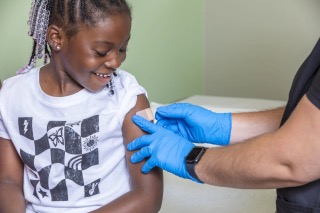TULSA, OK – [May 22, 2014] – As temperatures rise and people begin to spend more time outdoors, the Tulsa Health Department reminds residents of Tulsa County to take precautions against tick- and mosquito borne diseases including West Nile virus (WNV) and Rocky Mountain spotted fever.
The Tulsa Health Department operates a mosquito surveillance program in order to confirm when WNV is present in the community. Special mosquito traps are set in various locations throughout Tulsa County. Samples are collected and tested weekly for the presence of WNV. The Tulsa Health Department also works to control mosquito populations during the spring and summer. In a typical mosquito season, THD sprays hundreds of square miles for adult mosquitoes.
“Our environmental specialists will begin setting mosquito traps tomorrow,” said Bernard Dindy, environmental health services program manager. “The objective of our surveillance is to detect the presence of mosquitoes, determine abundance, species, make a risk assessment, and provide a basis for control. We plan on controlling the mosquito population by larviciding and adulticiding when necessary.”
West Nile virus is spread through the bite of an infected mosquito, which feeds on infected birds and then transmits the virus when biting humans, horses, and some other mammals. Symptoms of WNV include sudden onset of fever, headache, dizziness, and muscle weakness. Long-lasting complications can include difficulty concentrating, migraine headaches, extreme muscle weakness and tremors, and paralysis of a limb. If one or more of these symptoms develop, especially after suffering mosquito bites within the previous two weeks, a health care provider should be contacted. Persons over the age of 50 are at greatest risk of developing severe neurologic disease from WNV infection. Some of the neurological effects of WNV may be permanent.
The symptoms of a tickborne illness may include fever, headache, muscle aches, vomiting, and abdominal pain. Other symptoms may include a skin rash or painful swelling of lymph nodes near the tick bite. Tickborne diseases can be treated successfully with early diagnosis and appropriate antibiotics, so it is important to quickly seek medical attention if a fever and other signs of illness are noticed within 14 days of a tick bite or being in an area where ticks are prevalent.
Basic prevention measures include the following:
Remove sources of standing water that mosquitoes require to breed. Empty those items in your yard that can hold standing water so mosquitoes don’t have a place to breed. Birdbaths and animal watering areas should be cleaned and refilled every two to three days, or treated with mosquito dunks to kill mosquito larvae.
Be aware of peak exposure times and places. Exposure to mosquito and tick bites may be reduced by modifying patterns of activity or behavior. Although mosquitoes may bite at any time of day, peak biting activity for mosquitoes carrying some diseases (such as dengue and chikungunya) is during daylight hours. Mosquitoes carrying other diseases (such as malaria) are most active in twilight periods (dawn and dusk) or in the evening after dark. Avoiding the outdoors or focusing prevention activities during peak hours may reduce risk. Place also matters; ticks are often found in grasses and other vegetated areas.
Wear appropriate clothing. When weather permits, people can minimize areas of exposed skin by wearing long-sleeved shirts, long pants, boots, and hats. Tucking in shirts, tucking pants into socks, and wearing closed shoes instead of sandals may reduce risk. Use an insect repellent containing DEET on skin and clothing according to directions.
Check for ticks after being outdoors. Conduct a full body check upon return from potentially tick-infested areas, which even includes your back yard. Pay particular attention to waistbands, hairline and back of neck, in the armpits and groin area. Remove attached ticks as soon as possible using tweezers or fingers covered with a tissue. Don’t forget to check your pets for ticks as well, and ask your veterinarian about tick control regimens.
To submit a complaint about mosquitoes in your area, please click here. You can also call 918-595-4219 to leave a message on the mosquito hotline.




